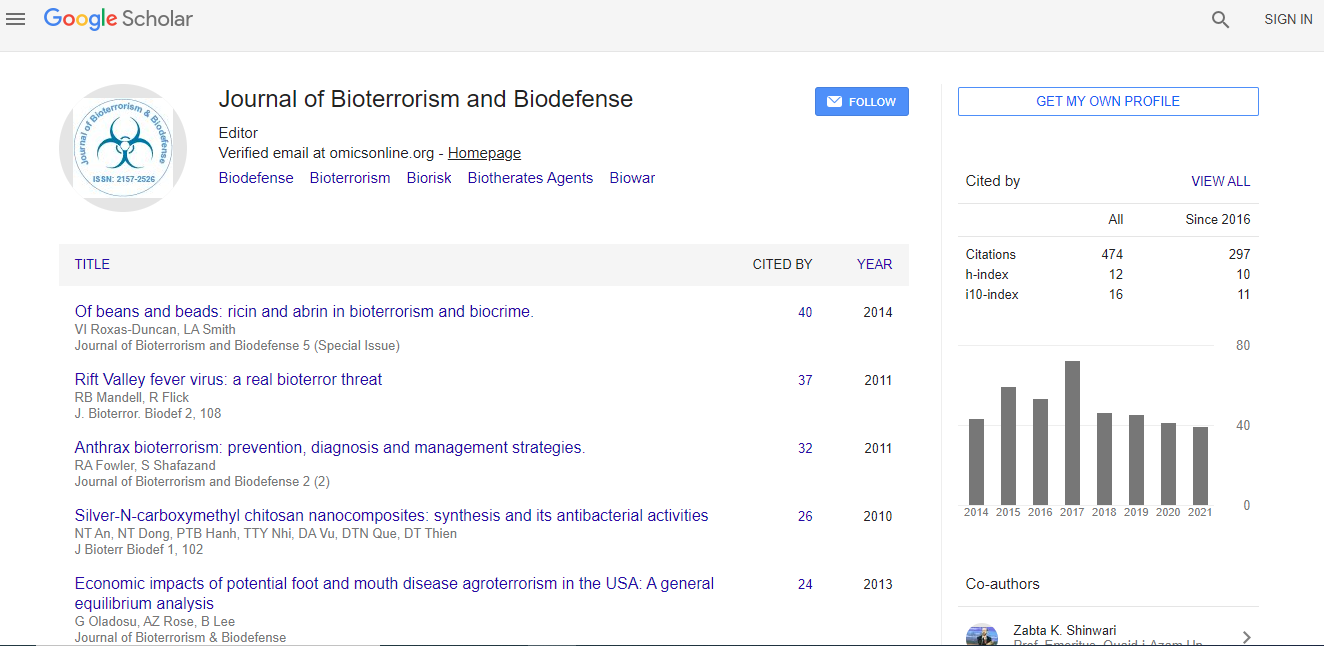Review Article
Development of Anti-Toxins Antibodies for Biodefense
Thibaut Pelat1, Arnaud Avril1, Siham Chahboun1, Jacques Mathieu2 and Philippe Thullier1*
1Unité de biotechnologies des anticorps et des toxines, Département de biologie des agents transmissibles, Institut de recherche biomédicale des armées (IRBA-SSA), 24 avenue des Maquis du Grésivaudan, 38702 La Tronche, France
2Département de biologie des agents transmissibles, Institut de recherche biomédicale des armées (IRBA-CRSSA), 24 avenue des Maquis du Grésivaudan, 38702 La Tronche, France
- *Corresponding Author:
- Philippe Thullier
Unité de biotechnologies des anticorps et des toxines
Département de biologie des agents transmissibles
Institut de recherche biomédicale des armées (IRBA-CRSSA)
24 avenue des Maquis du Grésivaudan, 38702 La Tronche, France
E-mail: pthullier@yahoo.com
Received Date: September 15, 2011; Accepted Date: November 15, 2011; Published Date: November 18, 2011
Citation: Pelat T, Avril A, Chahboun S, Mathieu J, Thullier P (2011) Development of Anti-Toxins Antibodies for Biodefense. J Bioterr Biodef S2:005 doi: 10.4172/2157-2526.S2-005
Copyright: © 2011 Pelat T, et al. This is an open-access article distributed under the terms of the Creative Commons Attribution License, which permits unrestricted use, distribution, and reproduction in any medium, provided the original author and source are credited.
Abstract
Antibodies (Abs) may significantly improve the outcome of diseases caused by toxins of military interest, in particular ricin and botulism toxins. The efficacy of Abs to neutralize ricin was demonstrated in vivo utilizing Abs of animal origin but recombinant antibodies (rAbs), which would be better tolerated, are preferred for clinical use. Animal Abs are utilized at present as medical countermeasure to neutralize botulism toxins, but they show limitations and rAbs are also preferred for this clinical use. Of note, anthrax is an infective disease depending on toxins for its pathogenicity, and it was demonstrated that anti-anthrax toxins Abs could be of benefit when used as adjunct to antibiotics. We used an original strategy, starting from libraries derived from lymphocytes of non-human primates (NHP) immunized with the toxin of interest, to isolate Abs directed against all these toxins. The libraries are screened by the phage-display technology to isolate the best candidates, which are then tested for their toxin neutralization properties. Abs neutralizing the anthrax lethal toxin (35PA83, 2LF) and ricin (43RCA) have been isolated and at present, Abs neutralizing the botulinum toxins (BoNT) A, B and E are being isolated.

 Spanish
Spanish  Chinese
Chinese  Russian
Russian  German
German  French
French  Japanese
Japanese  Portuguese
Portuguese  Hindi
Hindi 